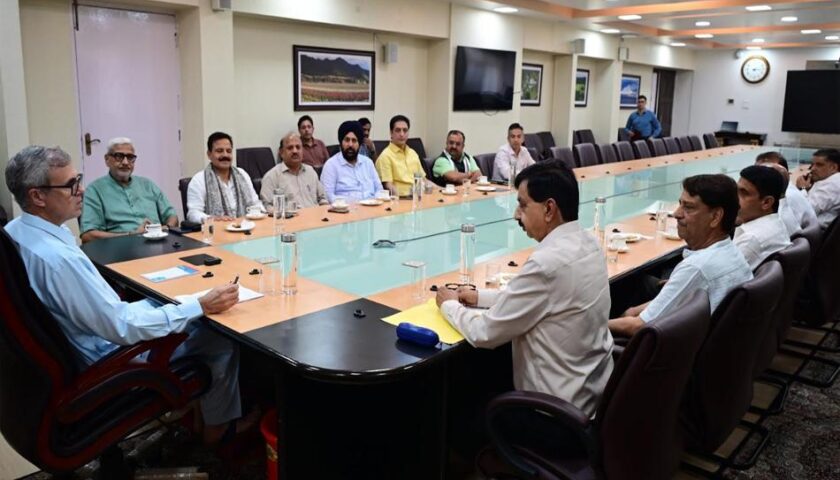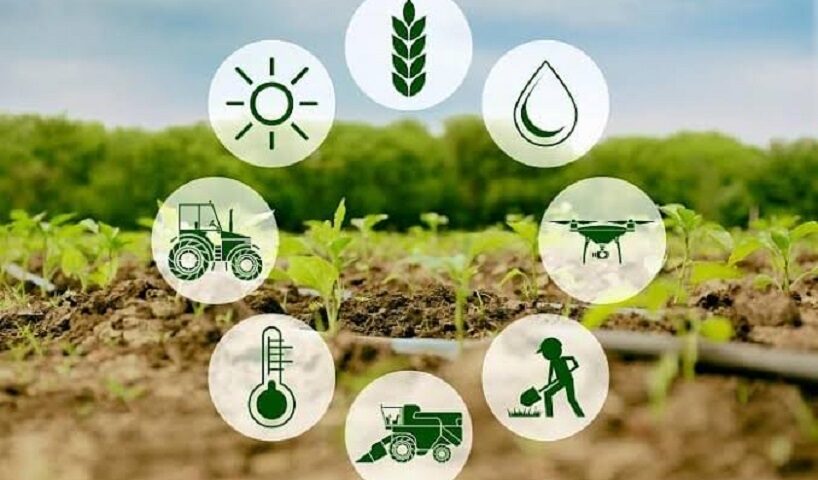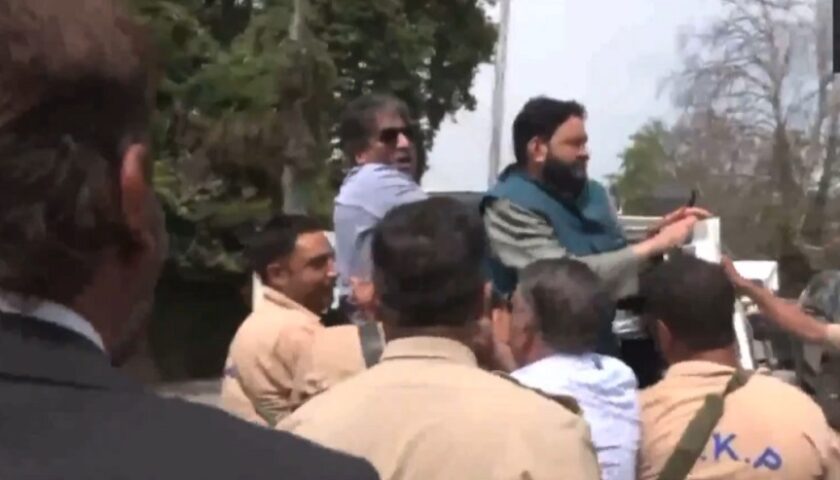- High-speed mobile data services will continue only in the districts of Ganderbal and Udhampur.
- Petition in the Supreme Court states that Doctors in Jammu & Kashmir have reported that they are unable to download the latest studies, protocols, manuals, and advisories due to slow internet speed.
The Jammu and Kashmir administration has extended the ban on high-speed mobile data services across the Union Territory, except Ganderbal and Udhampur, till February 6.
High-speed mobile data services will continue in the districts of Ganderbal and Udhampur, while in other districts, the internet speed will be restricted to 2G only, read an order dated January 22, by the Home Department of Jammu and Kashmir.
The Home Department said that restrictions have been placed “in view of well founded apprehensions about the dissemination of inflammatory and seditious propaganda material”. Adequate access to the internet through broadband services over landline has been allowed, it said.
The administration highlighted that the reports of the law enforcement agencies indicate that these restrictions have helped thwart the “nefarious designs of the radical and terrorist organisations operating in Jammu and Kashmir to misguide, provoke and incite the youth in furthering their anti-India agenda since regulation of high speed mobile internet prevents easy streaming/dissemination/downloading of such material/videos”.
Asserting that threat perception on the security front in the Union Territory continues to be high, the Home Department said that there are “credible intelligence inputs about the preparedness of terrorists to infiltrate from across the international border/Line of Control, is also borne out from recent infiltration attempts, umpteen number of ceasefire violations and seizure of arms/ammunition”.
Reports further suggest the data services that rely on availability of high speed internet are extensively utilized for coordinating and facilitating infiltration, it said.
Mobile internet services were suspended in Jammu in August last year, in view of security concerns in the wake of the abrogation of Article 370 that granted special status to the erstwhile State.
Six months later in January 2020, the low-speed or 2G internet service on mobile phones was restored. On January 9, the ban on high speed mobile internet was extended till January 22.On August 16, 2020, high-speed mobile data services were restored on a trial basis in Ganderbal and Udhampur for post-paid sim card cardholders.
Meanwhil, an association of 3,800 private schools of Jammu and Kashmir has moved Supreme Court challenging the December 11, 2020, order of the Central government restricting internet speed in Jammu & Kashmir to 2G as violative of Article 14, 19 and 21 of the Indian Constitution.
The petition by Private Schools Association of J&K has sought restoration of 4G mobile internet services in J&K stating that it was constrained to file the petition “after more than 500 days of continuous internet restrictions which have developed a routine and permanent character.”
The Central government had restored 4G mobile internet access in two districts – Ganderbal in Kashmir Division and Udhampur in Jammu Division, last year. However, mobile internet speed continue to be limited to 2G in all other 18 districts of Jammu & Kashmir.
This would be the third petition filed in Supreme Court since August 2019 challenging internet restrictions in Kashmir which were introduced after the abrogation of Article 370.
Anuradha Bhasin, Editor of Kashmir Times, was the first to approach the Supreme Court on August 10, 2019 challenging the restrictions
The Supreme Court eventually pronounced its judgment in that petition on January 10, more than 5 months after the restrictions were put in place.
The court held that freedom of speech and expression through internet and freedom to carry on trade or profession through internet is a fundamental right under Article 19 of the Constitution.
It also clarified the law concerning orders passed under Suspension Rules. First, orders suspending internet can be only for a temporary duration and not an indefinite period; Second, such orders should clearly indicate the specific reasons for imposing the restrictions; Third, such orders should be published and the validity of such orders can be reviewed by courts.
After the Supreme Court judgment, an order was issued by Union Territory of J&K on January 14 restoring limited internet services in J&K. Fixed line connectivity was allowed in Kashmir for institutions offering essential services like hospitals after installation of firewalls and whitelisting. 2G mobile internet services were allowed for post-paid users to access whitelisted sites in Jammu, Samba, Kathua, Udhampur and Reasi.
However, internet service providers were directed to restrict internet speed to 2G for all mobile internet users.
In March 2020, NGO, Foundation for Media Professionals moved the Supreme Court challenging the restrictions on mobile internet speed to 2G arguing that patients, doctors, and general public of J&K were unable to access latest information, guidelines, protocols and advisories about COVID- 19 because of the slow internet speed.
The Supreme Court passed a detailed judgment on May 11 in which it refrained from passing directions to restore 4G mobile internet services instead asking a special committee comprising high level government officers to take a call on the same.
The very same day, the J&K administration passed an order continuing restrictions on mobile speed to 2G. Another order was passed on May 27 extending such restrictions till June 17.
The same NGO then filed a petition before the top court on June 8 seeking initiation of contempt of court proceedings against the central government and J&K on the ground that no action was taken to comply with the top court’s judgment of May 11 to review restrictions on internet speed.
The top court closed the contempt case after the Centre informed the Supreme Court that it will relax restrictions on high speed 4G mobile internet services in one district each of Jammu and Kashmir divisions of the Union Territory.
The present petition has primarily raised concerns about how the restriction in internet speed in the valley are detrimental to the interests of students, business and medical professionals.
The petitioner association states that while students from Class 9 to 12 have been permitted to visit schools on a voluntary basis in Jammu & Kashmir, expecting younger students to attend physical classes is inadvisable since they may not have the maturity required to adhere to health and safety protocols.
But with the slow internet speed, attending online classes is not possible for students with, the petition highlights.
It states that online classes will remain necessary for students who are unable to attend physical classes for various reasons including having a co-morbidity or living with family members who have a co-morbidity.
“Doctors in Jammu & Kashmir have reported that they are unable to download the latest studies, protocols, manuals and advisories due to slow internet speed. Further, patients in Jammu & Kashmir are being forced to flock at hospitals which are hotbeds of infection and subject themselves to the risk of contracting COVID-19 because telemedicine is virtually impossible at 2G speed,” the plea adds.
Making a case for how the December 11 order violates the constitutional provisions the plea states that Article 21A of the Constitution imposes an obligation on the State to provide “free and compulsory education to all children of the age of six to fourteen years in such manner as the State may, by law, determine.”
“It is, therefore, clear that no exceptions to the duty are envisaged in the said Constitutional provision and the right recognized therein is inalienable,” reads the plea.
The central government has consistently cited militancy and cross border terrorism as the reason for restricting internet speed in J&K.
“It is a very serious issue. Militancy is still there. When a militant was killed about 500 people came for the funeral. They are being made into martyrs,” Attorney General KK Venugopal had said during one of the hearings.






